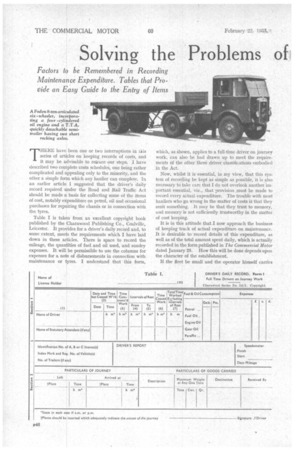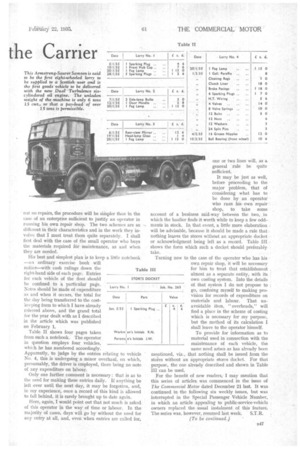Solving the Problems of the Carrier Da
Page 64

Page 65

If you've noticed an error in this article please click here to report it so we can fix it.
Factors to be Remembered in Recording Maintenance Expenditure. Tables that Provide an Easy Guide to the Entry of Items THERE have been one or two interruptions in titis series of articles on keeping records of costs, and it may be advisable to retrace our steps. I have described two coMplete costs schedules, one being rather complicated and appealing only to the minority, and the other a simple form which any haulier can complete. In an earlier article I suggested that the driver's daily record required tinder the Road and Rail Traffic Act should be made a basis for collecting some of the items of cost, notably expenditure on petrol, oil and occasional purchases for repairing the chassis or in connection with
the tyres. .
Table I is taken from an excellent copyright book published by the Charnwood Publishing Co., Coalville, Leicester. It provides for a driver's daily record and, to some extent, meets the requirements which I have laid down in these articles. There is space to record the mileage, the quantities of fuel and oil used, and sundry expenses. It will be permissible to use the columns for
expenses for a note of disbursements in connection with maintenance or ',yres. I understand that this form,
which, as shown, applies to a full-time driver on journey work, can also be had drawn up to meet the requirements of the other three driver classifications embodied in the Act.
Now, whilst it is essential, in my view, that this system of recording be kept as simple as possible, it is also necessary to take care that I do not overlook another important essential, viz., that provision must be made to record every actual expenditure. The trouble with most hauliers who go wrong in the matter of costs is that they omit something. It may be that they trust to memory, and memory is not sufficiently trustworthy in the matter of cost keeping.
It is in this attitude that I now approach the business of keeping track of actual expenditure on maintenance. It is desirable to record details of this expenditure, as well as of the total amount spent daily, which is actually recorded in the form published in The Commercial Motor dated January 25. How this will be done depends upon the character of the establishment.
If the fleet be small and the operator himself carries
Workm an's Initials R.N. Forema n's Initials LW,
• out no repairs, the procedure will be simpler than in the case of an enterprise sufficient to justify an operator in running his own repair shop. The two schemes are so. different in their characteristics and in the work they involve. that I must treat them quite separately. I shall first deal with the case of the small operator who buys the materials required for maintenance, as and when they are needed.
His best and simplest plan is to keep a little notebook --an -ordinary exercise book will suffice—with cash rulings down the right-hand side of each page. Entries for each vehicle of the fleet should Notes should be made of expenditure
be confined tO a particular page. Lorry No. 1 the day being transferred to the cost as and when it occurs, the total for Date Part keeping form to which I have already Jan. SAS referred above, and the grand total for the year dealt with as I described in the article which was published on February 1.
Table II shows four pages taken from such a notebook. The operator in question employs four vehicles, which he has numbered accordingly.
Apparently, to judge by the entries relating to vehicle No. 4, this is undergoing a minor overhaul, on which, presumably, the driver is employed, there being no note of any expenditure on labour.
Only one further comment is necessary : that is as to the need for making these entries daily. If anything be left over until the next day, it may be forgotten, arid, in my experience, once a record of this kind is allowed to fall behind, it is rarely brought up to date again.
Here, again, I would point out that not much i$ asked of this operator in the way of time or labour. In the majority of cases, days will go by without the need for any entry at all, and, even when entries are called for, Table III
STORES DOCKET I Sparking Plug ..
one or two lines will, as a general rule be quite sufficient.
It may be just as well, before proceeding to the major problem, that of considering what has to be done by an operator who runs hisown repair shop, to take some
account of a business mid-way between the two, in which the haulier finds it worth while to keep a few odd-. ments in stock. In that event, a little more elaboration . will be advisable, because it should be made a rule that nothing leaves the stores without an appropriate docket or acknowledgment being left as a record. Table III shows the form which such a docket should preferably
take.
Turning now to the case of the operator who has his own repair shop, it will be necessary for him to treat that establishment almost as a separate entity, with its own costing system. Into the details
Job. No. 263 of that system I do not propose to go, confining myself to making provision for records of expenditure on
Value
materials and labour. That un
6 avoidable item, "overheads," will d.
find a place in the scheme of costing which is necessary for my purpose, but the method of its calculation I shall leave to the operator himself. To provide for information as to material used in connection with the maintenance of each vehicle, the same need arises as has already been mentioned, viz., that nothing shall be issued from the stores without an appropriate stores docket. For that purpose, the one already described and shown in Table III can be used.
For the benefit of new readers,. 1 may mention that this series of articles was commenced in the issue of The Commercial Motor dated December 21 last. It was continued in the following six weekly issues, but was interrupted in the Special Passenger Vehicle Number, in which an article appealing to public-service-vehicle owners replaced the usual instalment of this feature,.
The series was, however, resumed last week. S.T.R.




































































































